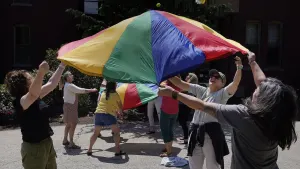More Stories
An AP source says the Trump administration is asking states to speed up deliveries of COVID-19 vaccines to people over 65, and others at risk, and to no longer hold back the second dose. The U.S. Centers for Disease Control and Prevention is expected to announce the recommendation soon. States determine who should get the vaccine based on CDC guidelines.
As we have been reporting the COVID-19 vaccine rollout has been slower than expected. According to the CDC, 25 million vaccines have been distributed, but just about 9 million people have gotten the first dose of the shot.
This morning, News 12 is hearing frustration from many people across the tri-state because they can't find a place to get vaccinated. All-night vaccinations are underway at New York City's two 24/7 vaccine mega-sites, at the Brooklyn Army Terminal in Sunset Park, and the Bathgate Contract Postal Station in the Bronx. Both were completely booked overnight, an indication of how high the demand is for the shots.
Staggering numbers of new coronavirus numbers are reported every day. For the past week, the U.S. averaged more than 3,000 COVID-19 deaths per day, and more than 200,000 new virus cases have been reported every single day for the last week.
That means there have been more than 1.7 million new infections in the last seven days alone.
This morning, News 12's Elizabeth Hashagen was joined by Dr. Thomas McGinn to talk about the situation in the hospitals.
Dr. McGinn is the executive vice president of physician enterprise at CommonSpirit Health.
Health officials had warned the pandemic would make winter one of the most difficult times in U.S. history. That prediction is quickly proving true. December was devastating, and January could be deadlier.
The grim numbers have been fueled by last month's holiday travels, and gatherings that experts had warned against.
Dr. McGinn, whose health system operates 137 hospitals and more than 1,000 cares sites across 21 states, gives us an idea of what it's like for hospitals right now:
We are hearing this morning from the surgeon general that today governors will receive clear guidance from the CDC that they should immediately expand vaccines to 65+, and those under 64 who have a comorbid condition.
According to the New York City data, hospitalizations across the five boroughs are up 12% the last seven days over the previous weekly average, while confirmed COVID-19 deaths are up 11%. New cases are up 24% in that time.
People age 75 and older account for roughly 30% of the new hospitalizations, and 58% of the deaths, but just 6% of new cases. And they account for the overwhelming majority of deaths since the pandemic started. To date, the confirmed toll statewide has well topped 30,000. Dr. McGinn talks about these numbers:
New Jersey state officials insist they are not getting enough coronavirus vaccines from the federal government. But now we are learning doses of the vaccine are going to waste. New Jersey has only used about 40% of the doses they received. We have learned that some of those available shots end up in the garbage. The state health commissioner says they are aware of the situation, but she couldn't provide specifics on how many shots are wasted. But she did say the number of shots wasted is minimal in connection to the number of doses out there. The health commissioner is now encouraging vaccine sites to give leftover shots to anyone, even those still technically not eligible, to avoid waste. Dr. McGinn talks about how to efficiently administer the vaccine:
Some vaccines can provide protection for months or years and others a lifetime. Data from the extensive clinical trials conducted on the COVID-19 vaccines does not tell us how long any immunity lasts. This will become clearer over time and is something manufacturers and regulators will monitor carefully.
Moderna's COVID-19 vaccine should provide immunity from the disease for at least one year after vaccination, the company announced at a conference Monday.
While clinical trials showed the vaccine to be highly effective at preventing disease, they do not show precisely how long this immunity will last and it is possible that a new coronavirus vaccine will be required on a regular basis to boost the immune system after this yearlong period has passed.
Unlike many other vaccines which rely on weakened or dead viruses that must be grown in vast quantities, this molecule can simply be tweaked as needed and put back into the vaccine. Dr. McGinn speaks about immunity and how long it could last:
Monday's numbers show more than 30,000 patients in the hospital, compared to 18,000 during the first peak of the virus in the U.K. in April. The health minister there says they are now at a situation where in the U.K. as a whole, around one in 50 people is infected, and in London it's around 1 in 30.
Knowing that the U.K. variant is in our area, why is it more contagious and how is it different?
More from News 12
1:28

5 simple steps for long-term benefits to your health and heart
1:32

8 tips for working safely during hot weather
3:31

Guide: Ways to set your child up for financial success
3:18

Guide: The importance of good sleep and how to get it

Guide: Mental health resources available in the tri-state
9:36
